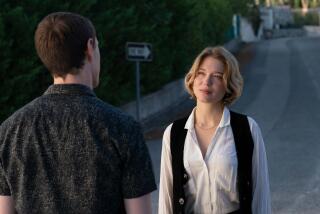Potent stroll into reality
- Share via
For 20-year-old Bruno, everything is fungible, negotiable, for sale. He’s got the morals of a sneak thief, because that’s what he is. Do you like his favorite hat? It’s yours, for a price. A hustler and panhandler, living fecklessly in the moment on the streets of a Belgian industrial town, he mocks those who have regular jobs and simply does whatever comes to hand.
So when Bruno is introduced to his 9-day-old son by his young girlfriend Sonia, he does the expedient thing, the thing his whole life has pushed him toward: Almost without thinking about it, he sells the baby to an adoption ring for a thick wad of cash.
But this horrific action, one that Bruno considers more or less business as usual, suddenly pushes him over a line he never knew existed. For Jean-Pierre and Luc Dardenne’s quietly devastating film “L’Enfant” (The Child) is not really about what happens to that baby. It’s about what that act does to Bruno, about the brutal consequences of the sudden discovery that everything is not a commodity.
“L’Enfant” was last year’s winner of the Palme d’Or at Cannes; another Dardennes effort, “Rosetta,” won the award in 1999. In these and the still earlier “La Promesse,” the Belgian directing brothers deal with themes they have made their own: the difficulty of being moral in an amoral world and the grinding, unforgiving nature of reality for those forced by poverty to live on the margins of society. These are not easy films to experience, but they are uncompromising and unforgettable.
Before they made dramatic features, the Dardenne brothers had an extensive background as documentarians. That gives “L’Enfant” an unemotional, even implacable point of view. This act of simply observing graces the film with a vivid sense of unavoidable reality. The intensity and intimacy of cinematographer Alain Marcoen’s style follows the film’s characters as closely as a second skin. We are so deeply into the dailiness of their lives we never even have a sense of eavesdropping: We are simply there.
This focus on actuality demands naturalistic acting from the principals, and in this “L’Enfant” excels. Newcomer Deborah Francois is exceptional as 18-year-old new mother Sonia, but the focus is more on Jeremie Renier, who effortlessly carries the movie as Bruno. A decade ago, Renier made his debut in the Dardennes’ “La Promesse,” playing a boy who was a stranger to morality.
The actor may be grown up now, but the character he plays is equally at a loss when it comes to knowing how to do the right thing.
It is the waif-like Sonia we meet first, protectively cradling the baby in his tiny blue jumpsuit, looking for Bruno. She has come home to discover Bruno has sublet her apartment to strangers and is living on the street, running a gang of even younger artful dodgers and keeping his clothes in an abandoned dumpster. “I find money,” runs his credo, “so there is no need to hang onto it.”
Though a lesser film would present Bruno as a stark exploiter indifferent to Sonia and their child, “L’Enfant” refuses to make it that simple. There is an unmistakable emotional bond between these two, they really care for each other, and though Bruno may live for transitory pleasures -- a flash jacket, an afternoon in an enormous convertible -- he would rather share them with Sonia than experience them alone.
When Bruno kick-starts the film’s narrative with his spur-of-the-moment decision to relinquish the baby, “L’Enfant” insists the audience taste the horror he won’t or can’t allow himself to. For if they are after nothing else, the Dardennes are determined to demonstrate how little room to maneuver there is for individuals marginalized by implacable social forces, how difficult it can be to have ordinary feelings while living in painfully impoverished circumstances.
The exceptional thing about “L’Enfant” is how intensely dramatic the film makes the consequences of Bruno’s choice. Trapped by character and circumstance, he is all of a sudden deeply in over his head thrice over: emotionally with Sonia, criminally with his cohorts and legally with society. (Olivier Gourmet, Renier’s “La Promesse” costar, has a brief cameo as a policeman.)
Without Bruno realizing it, he has put powerful forces into motion that he can in no way influence or contain. And as he gains a knowledge of how costly it can be to have essential human emotions, the wonder of it all is that he never loses our sympathy or our concern.
*
‘L’Enfant’
MPAA rating: R for brief language
A Sony Classics release. Writers-directors Jean-Pierre Dardenne, Luc Dardenne. Producers Denis Freyd and the Dardennes. Director of photography Alain Marcoen. Editor Marie-Helene Dozo. Running time: 1 hour, 40 minutes.
Exclusively at the Westside Pavilion Cinemas, 10800 Pico Blvd. at Overland Avenue, (310) 281-8223; Monica, 1332 2nd St., Santa Monica, (310) 394-9741; Playhouse, 673 E. Colorado Blvd., Pasadena, (626) 844-6500; Town Center, 17200 Ventura Blvd., Encino, (818) 981-9811; Edwards South Coast Village, 1561 W. Sunflower Ave., Santa Ana, (714) 540-1970.
More to Read
Only good movies
Get the Indie Focus newsletter, Mark Olsen's weekly guide to the world of cinema.
You may occasionally receive promotional content from the Los Angeles Times.










